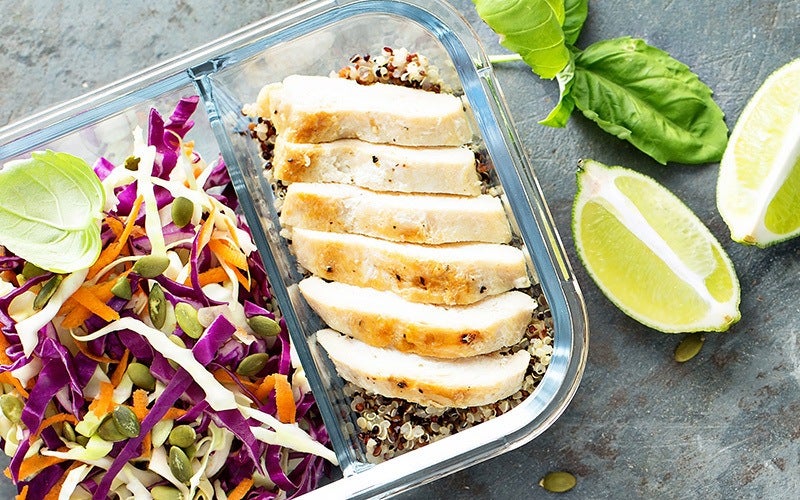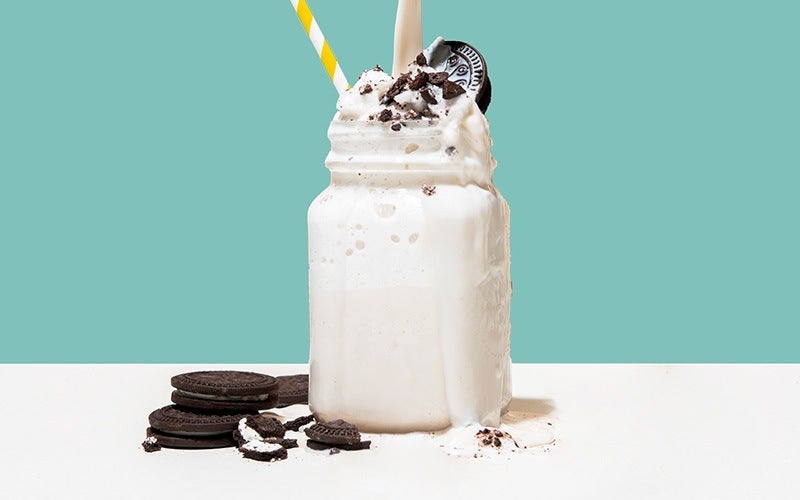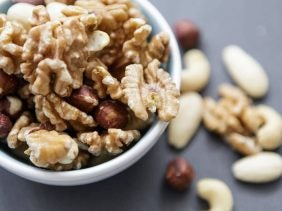How to lose weight without dieting: 13 tips to your feel-good body
 ©Maskot
©Maskot
Don’t feel like following a strict diet? Neither do we! Instead, we’ll show you how to lose weight without dieting. With the right approach, you can maintain your feel-good weight over the long term.
Lose Weight Without Dieting: Keep it Simple
Losing weight is not as complicated as it often seems. All you need is a calorie deficit, which means that you burn more calories throughout the day than you take in through food and drinks.
Our tip: With our free Body Check it’s easy to find out how many calories you should aim for to reach your personal goal.
Reaching your target weight without a diet means you don’t have to give up your favorite foods, and you don’t have to follow a strict healthy eating nutrition plan. All you have to do is incorporate these two basic ways to lose weight into your routine:
- Reduce the calories you consume until they’re less than what you burn per day
- Increase the calories you burn until they exceed your intake

Do Long-Term Diets Work?
Most diets only help you lose weight as long as you stick to them. The problem is that most people don’t follow a strict diet for more than a few months. Even worse: many fad diets aren’t very balanced. If you eat less to be in a deficit, don’t exercise, and eat very little protein, you’ll not only lose fat, but muscle as well.
Muscles are important for the total calories you burn. If you lose muscle mass, your maintenance calories will also decrease. As they decrease, your calorie deficit will also get smaller and smaller, and eventually you won’t be in a deficit at all. That’s the point where your diet just stops working.
The yo-yo effect: If you give up your diet in frustration and then fall back into your old eating habits, you’ll probably experience the yo-yo effect. You’ll be eating the meals and portion sizes you did before, but now that you have less muscle mass overall, and therefore need fewer calories, you’ll experience even more weight gain than before.
To lose weight with no diet you’ll need to take smaller but more effective steps. We’ve summarized some of the best tips to help you along the way below.
Long-Term Weight Loss: 13 Tips
1. Exercise and working out
If you exercise or go to the gym, you’ll increase your maintenance calories. For example, a 75 kg, 1.75 m tall, 30-year-old man will burn about 660 calories in one hour of jogging at a speed of 6 minutes per kilometer. That’s almost as much as a kebab! As always, the exact number of calories you’ll burn will depend on your age, height, weight, and sex.
If your speed increases, your calorie totals will continue to go up. If the same person runs at a speed of 5 minutes per kilometer, they’ll burn 808 calories per hour.
Another plus: Working out builds up your muscles. More muscles means you’ll burn more calories, even when you’re not working out.
Editors’ tip: Muscles need protein to grow. Our delicious Cookies and Cream Whey Protein has 24g per shake!
2. Move more throughout the day
Increase the calories you burn every day just by adding more exercise into your daily routine. Ride your bike to work or the supermarket. Take the stairs instead of the elevator and go for a walk during your lunch break. That way you’ll keep your circulation active and burn more calories at the same time.
3. Drink enough water
We cannot tell you how important it is to drink enough water. Not only because it’s crucial for your health and most bodily functions, but also because it helps you reach your feel-good weight. A 2007 study showed that we burn about 24% more calories per hour after drinking 500 ml of water.
Find out how to drink enough water every day
4. Make sure to relax regularly
Stress isn’t a bad thing in general. It activates your body and mind and can help you reach peak performance. It’s only unhealthy if you’re permanently under stress and never take time for relaxation. This kind of on-going strain can even affect your hormone balance and help fat accumulate faster.
5. Give your muscles a break
Feeling super motivated and planning to exercise every day to help burn as many calories as possible? That’s wonderful, but every now and then your muscles will need a break. Even if the increased blood flow during a workout makes it look like your muscles have already grown, that’s just a temporary illusion.
Real muscle regeneration and growth only begins in the recovery phase. The principle of balancing exercise and recovery is one of the 7 principles covered in our article on the fundamental theory behind training plans.
Everything you need to know about the 7 principles of exercise

6. Eat only when you’re hungry
Learn to listen to your body with intuitive eating. Eat only when you’re really hungry and not just because you’re bored, angry, sad, or because you want to reward yourself. It’s also important to know the difference between hunger and thirst. If you think you’re hungry, drink a glass of water first and see if your feeling of hunger changes.
Check out our article on intuitive eating for ten principles to get you started.
Find out more about intuitive eating
7. Eat consciously
Like to watch TV, play with your phone, or listen to music while you eat? That makes eating a secondary activity. You’re distracted, so you might not be paying attention to your real hunger and satiety signals. You’ll just keep going, which increases your chances of overeating and subsequent weight gain.
8. Use a small plate
Many people swear they eat less when they use a smaller plate, because they use smaller portion sizes in general, which means fewer calories in your meals. Try it out for yourself!
9. Don’t keep too much junk food around you
We’re not saying that you should never eat junk food again. Every now and then you should treat yourself! But you can make it easier to resist by being smart about where you keep high-sugar foods like candy. If you keep them by the couch or your desk, then you’re probably going to snack on them even when you don’t really want to. These kinds of snacks also won’t fill you up, but make you want to keep eating instead. Limiting the amount of food choices that are easily accessible will keep you from devouring an entire bag of cookies, for example.
10. Avoid calorie traps
Nuts are healthier than chips, sure. But nuts are also chock full of fat and calories, so they should be eaten with care and not in very large quantities. Other high calorie traps include juices and soft drinks. A small glass of juice often has as many calories as a whole banana.
11. Eat foods that will keep you fuller longer
Processed snacks often not only have tons of calories, but also sugar and fat. They also rely on flavor enhancers to tempt you into eating more. It’s better to switch to natural snacks with lots of protein and fiber from whole grains to help keep you full.

12. Steer clear of alcohol
Alcohol doesn’t help you reach or maintain your feel-good weight. On the one hand, alcohol contains even more calories than carbs do. On the other, alcohol can prompt hunger cravings, increase the stress on your body, and slow down your recovery phase.
13. List the foods you’re allowed to eat
Instead of focusing on all the things you’re not allowed to eat and drink every meal, just change your perspective and make a list of all the things you’re allowed to eat and drink. This way you will focus much more on the positive side of weight loss without going on a diet and waste less energy thinking about what you have to give up.
Conclusion
- A calorie deficit is what makes weight loss work.
- Any diet will only work as long as you keep following it.
- You’ll lose weight more effectively if you also plan in exercise.
- Focus on the things you’re allowed to eat and not on the things you should avoid.
- Don’t take on too much at once.
- Implement lifestyle changes gradually so you don’t get overwhelmed.
Sources for this article
We at foodspring use only high-quality sources, including peer-reviewed studies, to support the facts within our articles. Read our editorial policy to learn more about how we fact-check and keep our content accurate, reliable, and trustworthy.

































